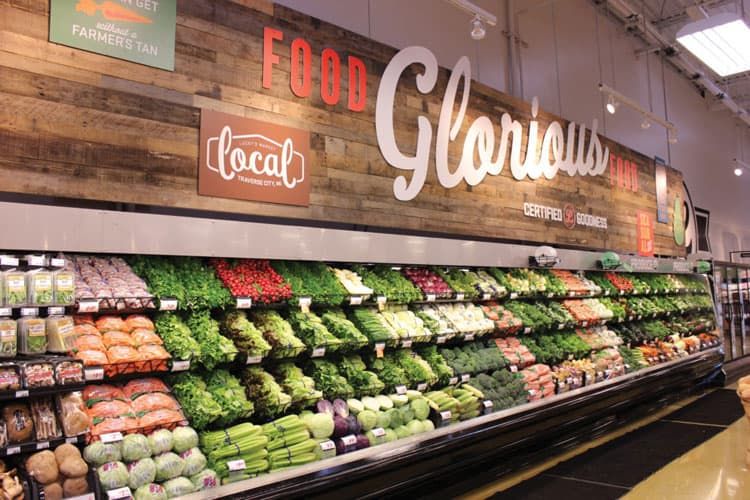Hard Luck: Lucky’s sees fortunes turn as company faces store closures, bankruptcy

NIWOT — After 16 years of riding a rocketship of growth and expansion, Boulder-born Lucky’s Market plummeted back to Earth in January with the announcement of widespread store closures and a declaration of bankruptcy.
Lucky’s story is one of entrepreneurial triumph followed by an ambitious — but ultimately doomed — attempt to leverage major corporate backing to transform the company from a beloved regional chain to a nationwide natural-foods powerhouse.
Founded in 2003 by husband and wife duo Bo and Trish Sharon, Lucky’s grew from a single grocery store location in north Boulder to a Kroger-backed firm with 39 stores in 10 states and a 200-employee corporate headquarters in Niwot.
SPONSORED CONTENT
How Platte River Power Authority is accelerating its energy transition
Platte River Power Authority, the community-owned wholesale electricity provider for Northern Colorado, has a history of bold initiatives.
As recently as last fall, the Sharons were bullish on their company’s potential for continued growth and success.
“We have a strategic plan to continue to grow, open new stores and bring more good food to more people in the years to come,” Bo Sharon told BizWest in late 2019.
But rather than opening new stores, the company is shuttering them.
At 7 a.m. on Jan. 21, thousands of Lucky’s employees at stores around the country were called into staff meetings where the news was broken: Lucky’s is closing 32 locations over the coming weeks.
“We’re all pretty depressed — I know I am,” Lucky’s Market Longmont employee Jeanne Papish told BizWest the day after the closures were announced to staff.
Over the next week, details of Lucky’s demise began to emerge as the company filed for Chapter 11 bankruptcy protection.
The Kroger effect
Lucky’s nationwide expansion can be traced back to 2016, when grocery giant Kroger Co. (NYSE: KR) invested an undisclosed sum in Lucky’s to form a “strategic partnership” with the local chain in 2016. Court documents would eventually reveal that Kroger loaned Lucky’s more than $301 million.
Kroger’s investment was used to help Lucky’s expand its footprint, which included 20 new stores in Florida. An additional 19 stores were either planned or under construction in Florida. Those projects will not move forward.
 “They opened too many stores too fast in too many markets,” Neil Stern, a retail industry analyst and senior partner at Chicago-based consulting firm McMillanDoolittle LLP, told BizWest. Once a company spreads itself so thin, “it becomes really challenging to efficiently run operations.”
“They opened too many stores too fast in too many markets,” Neil Stern, a retail industry analyst and senior partner at Chicago-based consulting firm McMillanDoolittle LLP, told BizWest. Once a company spreads itself so thin, “it becomes really challenging to efficiently run operations.”
Bankruptcy documents back up these assertions.
Lucky’s “expansion in Florida coincided with, among other things, increased competition in the grocery industry, including expansions from competing chains such as Sprouts Farmers Market, Fresh Thyme Farmers Market and Earth Fare,” according to filings. “As a result, notwithstanding the growth in sales, the portfolio of company stores was unable to achieve sustainable four-wall profitability.”
In December 2019, Kroger decided to divest its roughly 55 percent ownership stake in Lucky’s.
“The amount of investment that it would take for Lucky’s to be a meaningful contributor to Kroger overall and the efforts that it would take, we just didn’t think it created a good return for the investments that we needed to be made relative to that,” Rodney McMullen, Kroger chairman and CEO, said during a December earnings call with analysts and investors.
That divestiture, combined with slipping sales in many stores, sent Lucky’s into a tailspin that led to the store closures and bankruptcy filing, which indicated the company had $425 million in assets and approximately $600 million in liabilities.
“Most recently, fiscal year-to-date through Jan. 4, 2020, the company had approximately $22 million of store operating losses and approximately $100 million net loss,” according to an affidavit from Lucky’s chief financial officer Andrew Pillari. Year-to-date comparable-store sales were down 10.6 percent from the same period a year ago.
“It is very expensive to open new stores,” Stern said. Those expenses come from “both the [capital needed] to open them and to fund operating losses as they get to profitability.”

Lucky’s legacy
The Sharons, both chefs, launched Lucky’s with the goal of making organic food and natural products more accessible and affordable for the average consumer.
“We knew we wanted to stock the shelves with better food — food that we would want to eat, food that we would want to serve to our families, friends and children,” Bo Sharon told BizWest last year. “This meant that we worked to source clean, local and delicious foods. Our motto has always been Good Food For All.”
Lucky’s operates a community-impact program focused on supporting healthy communities and youth education. Every quarter, each of the company’s stores partners with a local nonprofit to donate 10 percent of sales on a given day to the organization; Lucky’s also provides other giving programs. The company supports its community-impact initiatives with the 10% For Good program, where 10 percent of purchases of Lucky’s private label products are reinvested into the communities where the stores are located.
Part of Lucky’s mission involved close partnerships with local vendors, many of which debuted products at Lucky’s stores.

“They are an important platform for local brands,” Boulder Chamber CEO John Tayer said. Lucky’s is a “business that represents both Boulder’s entrepreneurial spirit and Boulder’s commitment to fostering the local natural and organic food industry.”
What’s next?
“This is one of those significant bumps in the road not just for the business but for the community,” Tayer said. “But bumps in the road are part of the entrepreneurial experience.”
Despite the bumps, the Sharons appear intent to continue traveling down this particular road. Trish and Bo announced in late January that they have entered into a purchase agreement to buy the seven Lucky’s locations that will remain open, including the original north Boulder store and the Fort Collins store. In total, those seven stores employ about 600 people.
“We are grateful to our wonderful team members and customers for all their support, dedication and loyalty over the years,” Bo Sharon said in a statement when the purchase agreement was announced. “While this is a difficult situation across our company, we remain passionate and optimistic that we can continue to offer our communities access to healthful foods in this smaller footprint, preserving hundreds of jobs.”
Terms of the purchase agreement were not disclosed and have yet to appear in bankruptcy-court filings. The Sharons’ acquisition is subject to court approval.
Many of the other Lucky’s locations are likely to be converted into other grocery brands.
Aldi has agreed to purchase Florida Lucky’s locations in Coral Springs, Oakland Park, Sarasota, Vineland, Colonial Landing (Orlando) and Venice. Publix is buying stores in Naples, Neptune Beach, Clermont, South Orange (Orlando), and Ormond Beach. Southeastern Grocers Inc., which operates grocery store brands in the South such as Winn-Dixie and Bi-Lo, has also expressed interest in taking over Lucky’s locations in Florida.
“We’re hopeful that the Lucky’s legacy continues,” Tayer said.
NIWOT — After 16 years of riding a rocketship of growth and expansion, Boulder-born Lucky’s Market plummeted back to Earth in January with the announcement of widespread store closures and a declaration of bankruptcy.
Lucky’s story is one of entrepreneurial triumph followed by an ambitious — but ultimately doomed — attempt to leverage major corporate backing to transform the company from a beloved regional chain to a nationwide natural-foods powerhouse.
Founded in 2003 by husband and wife duo Bo and Trish Sharon, Lucky’s grew from a single grocery store location in north Boulder to…
THIS ARTICLE IS FOR SUBSCRIBERS ONLY
Continue reading for less than $3 per week!
Get a month of award-winning local business news, trends and insights
Access award-winning content today!


